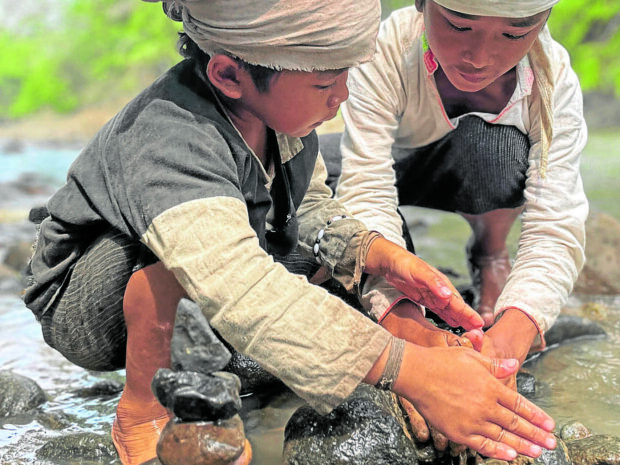Indonesian ethnic group requests internet blackout

‘AMISH OF ASIA’ | Children of the indigenous Baduy group play with rocks at a river in the village of Kanekes in Lebak, Banten province. A segment of the Baduy has chosen to live in the interior of its forest community and reject technology, including the internet. (Agence France-Presse)
JAKARTA — An indigenous community in Indonesia has requested an internet blackout in their area to minimize the “negative impact” of the online world, officials said on Friday.
The Baduy, a community of 26,000 in Banten province, Java Island, divide themselves into an outer group that partly adopts technology and a sacred inner group that shuns the trappings of contemporary life.
The inner group has asked authorities to shut down internet reception or divert nearby telecom towers so the signal would not reach them, according to a letter seen by Agence France-Presse (AFP).
“This request is a part of our efforts to minimize the negative impact of smartphones on our people,” Baduy representatives wrote.
They argued telecommunication towers built near their area could threaten their way of life and the morals of young people who may be tempted to use the internet.
Article continues after this advertisementOfficials said they had received the letter and will talk with Indonesia’s communications ministry to try to comply with the request.
Article continues after this advertisement“Essentially we want to always accommodate what the Baduy people want, [as they] need to maintain their traditions and local wisdom,” said Budi Santoso, an official of the regency of Lebak in Java.
But he said the internet was also needed by the outer Baduy who have started online businesses.
Yet other officials were also concerned that visitors or tourists accessing the web could show content that could be inappropriate to the Baduy.
Conservation site
Internet freedom in conservative, Muslim-majority Indonesia is a controversial issue. The government has banned gambling and pornography, and internet providers are required to filter out content.
Despite the censorship, however, illegal websites hosting inappropriate content are rampant.
The reclusive inner Baduy — dubbed the Amish of Asia by Western media — have chosen to live in the forest and reject technology, money, and traditional schooling.
They reside in three villages across a 4,000-hectare area that is several hours’ drive from this country’s capital.
The government declared the area a cultural conservation site in 1990.
Indonesia is a vastly diverse country with more than 1,300 ethnic groups spread across the archipelago.